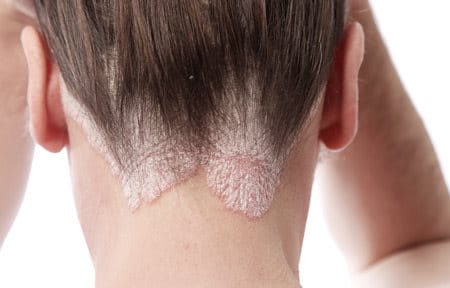Scalp psoriasis is a form of plaque psoriasis, which is the most common type of psoriasis.
It is a chronic condition and while doctors do not know exactly what causes it, this guide explains the symptoms and can help you treat the condition.

Scalp psoriasis is a form of plaque psoriasis, which is the most common type of psoriasis.
It is a chronic condition and while doctors do not know exactly what causes it, this guide explains the symptoms and can help you treat the condition.
Psoriasis is a non-contagious, autoimmune, inflammatory skin condition that causes very scaly red or white patches of skin. Between two to three percent of people worldwide are affected by psoriasis, according to experts.
Psoriasis on the scalp is a common skin disorder that can lead to raised, reddish areas that form as a single patch or several. This can affect your entire scalp, while it can also spread to the back of your neck, forehead or behind and inside your ears.

Scalp psoriasis severity can vary. It can be mild and almost unnoticeable, as some people experience no discomfort. However serious cases will become extremely itchy, causing crusty, thick sores that last a long time.
When your scalp's natural moisture balance is disturbed, an itchy head and a dry scalp are often the result. Intense itchiness can disturb your sleep and day-to-day life.
Common symptoms of psoriasis on the scalp include:
The difference in severity can be determined by the level of scaling, because mild psoriasis of the scalp appears as fine flakes, whereas severe scalp psoriasis is characterised by thick, crusted plaques covering most of the scalp.
Other skin disorders, like Seborrheic Dermatitis, may look similar to psoriasis. However, scalp psoriasis looks powdery with a silvery sheen, while Seborrheic Dermatitis appears greasy and yellowish.
While the exact causes of scalp and other kinds of psoriasis are unknown, it’s believed that psoriasis on the scalp occurs when something is wrong with your immune system, causing skin cells to grow too quickly and build up into patches.
Lifestyle and genetics may also be related to the condition, with doctors estimating that around 40% of psoriasis patients have a family member who also suffers with the condition. The following factors can increase your risk of psoriasis:
Those with scalp psoriasis may notice that their symptoms are worsened or triggered by a lack of vitamin D, alcohol addiction, skin infections or injuries, and some medications, including lithium, beta-blockers, antimalarial drugs, and iodides.
Unfortunately, it can take time to find the right scalp psoriasis treatment because everybody responds differently and it can be difficult to treat. However there are many different options available, and the first and easiest treatment to consider is the products you use directly on your skin, such as shampoos, creams, soaps, lotions and gels.
Eucerin DermoCapillaire Shampoo with 5% UREA is specifically designed for dry and itchy scalp conditions. It’s enriched with Urea and Lactate – two of the moisturising factors produced naturally by healthy skin – to give your dry, itchy scalp the nourishing care it needs. Used in conjunction with Eucerin DermoCapillaire Calming UREA Scalp Treatment, this scalp psoriasis shampoo soothes and relieves itching and dryness while giving your hair a healthy shine and supple feeling.
Eucerin DermoCapillaire Calming Urea Scalp Treatment is specifically designed for people with a dry and itchy scalp and can help treat scalp psoriasis. Its non-sticky leave-in formula delivers intensive moisture to your scalp, soothes and reduces itchiness from the first usage. It actively relieves your scalp from dryness that causes itching, to significantly improve its condition and help restore its hydration levels.
Topical treatments will be more likely to penetrate the top layers of skin when the scalp is softened. Soaking the scalp in warm (not hot) water and applying the Eucerin DermoCapillaire Shampoo to a damp scalp can help soften plaques. Softened plaques can then be removed by gently combing the scalp in light circular motions, with the comb almost flat against the scalp.
Topical treatments such as topical steroids (corticosteroids), Vitamin D analogues, tar products and emollients/oils can also help treat psoriasis on the scalp. There is no exact method to cure scalp psoriasis permanently, but following a treatment can help control symptoms, manage flare-ups, and prevent psoriasis from returning.

We deliver a holistic dermo-cosmetic approach to protect your skin, keep it healthy and radiant.

For over 100 years, we have dedicated ourselves to researching and innovating in the field of skin science. We believe in creating active ingredients and soothing formulas with high tolerability that work to help you live your life better each day.

We work together with leading dermatologist and pharmacist partners around the world to create innovative and effective skincare products they can trust and recommend.